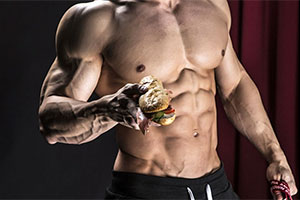Part of the large part of the etiology of weight gain is an incredibly strong feedback loop. And I’m not talking about insulin or leptin or some other hormone.
No, I’m talking about something MUCH stronger.
But before we go any further, lets clarify what I mean by etiology. Etiology is basically the study of why something occurs, and in my opinion the only thing more important that finding a cure for obesity is understanding why it occurs in the first place.
As I stated earlier this goes far beyond hormone imbalances or sugar cravings. Also, let’s be clear – overeating is the tool, it’s the hammer, or the nails… it’s what ‘makes’ us gain weight… but it may not be the ‘why’ that causes us to be gain weight… to find the ‘why’ we have to go all the way to the root – Why we overeat in the first place…
And I’m convinced that a large part of the etiology of weight gain, or more correctly a part of the etiology of some forms of weight gain (I’m of the belief that they’re not all the same), is the feedback loop created by the affect that our emotions have on how we eat.
For many of us, we over eat as a way to deal with our depression, boredom, loneliness or general unhappiness with our day-to-day lives. It’s an escape – a way to avoid dealing with the actual issue – whether it be an unhappy marriage, a bad job or some other issue that causes us to be unhappy.
So we eat. And it DOES help… a little bit, and only very briefly. And the minute we’re finished eating we begin to feel bad about the fact that we ate… so we reinforce the habit by eating more to help ease the pain behind the fact that we ate too much previously. When this cycle keeps going for a while we end up gaining weight, and now we eat to avoid the pain of our weight gain, AND the pain of the fact that we overate when we knew we shouldn’t have overeaten…
So we eat because we ate, and we eat because we gained fat, and we gained fat because we ate, so we eat some more…
On and on it goes.
To try and fix the problem we search on-line, learning about foods to eat or not eat, hormones that may or may not be out of whack, or 4 reasons why our workouts are making us fat, but in the end all of this is just a distraction from dealing with the real reason behind our weight gain.
After all, usually we’re googling ‘how do I lose fat’ instead of ‘how to I get my husband to stop being so mean’.
And that’s the kicker in all of this… the real reason ISN’T out of whack hormones, nor is it our body fat, nor is it the extra food we ate over the last couple months… yes all these things are important (sometimes very important) and they certainly add to the complexity of weight gain, but the REAL reason is the unresolved issue or feelings that we were trying to avoid by overeating in the first place.
Yes, we can absolutely lose weight without addressing these issues, but chances are that weight loss will be temporary… it might last months or even years, but without dealing with the true issue you will always be looking for a reason to avoid dealing with said issue.
While this all sounds dark and gloomy, remember that regardless of whether diet-induced weight loss can fix your true issue, it can, in a roundabout way, improve your ability to deal with those issues (so all is not lost).
A reoccurring theme in studying the long-term effects of weight loss include feelings of improved confidence and improve self-worth. And it also includes the feeling of accomplishment, and these things MAY help you deal with your other underlying issues.
In the end, the important take away from this post is that while many of us like to concentrate our attention on super sciency things like Lipase density in fat cells and how this affects weight loss, the truth is, weight loss is a multi-disciplinary, multi-factorial study – and until we accept that there is a giant human component to both weight loss and weight gain, we’re going to be stuck with an extremely low weight loss success rate.
There’s more to eating than just food. And there’s more to weight gain than just too much food.
So if you know someone who is struggling with their weight remember, yes they are gaining weight because they are eating more than they need to, but sometimes the reason they are eating more than they need to can be very complicated, personal, and possibly overwhelming.
The bottom line is not all weight gain is the same, and not all weight gain is caused by food.
(I hope I made myself clear concerning my use of the term *caused*)
BP









